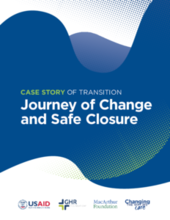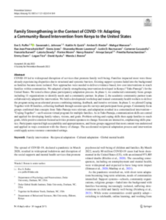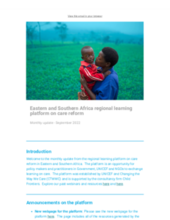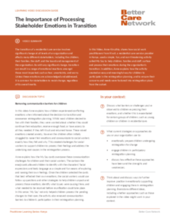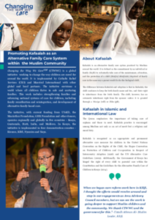This country page features an interactive, icon-based data dashboard providing a national-level overview of the status of children’s care and care reform efforts (a “Country Care Snapshot”), along with a list of resources and organizations in the country.
demographic_data
childrens_living_arrangement
children_living_without_bio
adoption
social_work_force
key_stakeholders
Key Stakeholders
Add New DataOther Relevant Reforms
Add New Datadrivers_of_institutionalisation
Drivers of Institutionaliziation
Add New Datakey_research_and_information
Key Data Sources
Add New DataChildren's Act, 2022 (Kenya)
Prevalence and number of children living in institutional care: global, regional, and country estimates
Social Protection and Disability in Kenya
Kenya Social Protection Sector Review
Country Care Review: Kenya
Child Developmental Disabilities, Caregivers’ Role in Kenya and Its Implications on Global Migration
Research findings on Alternative care system in Kenya for children without parental care
Charitable Children Institutions in Kenya: Factors Influencing Institutionalization of Children
Acknowledgements
Data for this country care snapshot was contributed by consultants with Maestral International.
Displaying 121 - 130 of 447
The Eastern and Southern Africa Regional Learning Platform hosted a webinar on September 20, 2022, with panel of experts who explored how the social service workforce can be strengthened to support care reform in Eastern and Southern Africa.
The Journey of Change and Safe Closure case story demonstrates the process of early engagement and awareness to supporting the long-term reintegration of children in families.
COVID-19 led to widespread disruption of services that promote family well-being. Families impacted most were those already experiencing disparities due to structural and systemic barriers. Existing support systems faded into the background as families became more isolated. New approaches were needed to deliver evidence-based, low-cost interventions to reach families within communities. The authors adapted a family strengthening intervention developed in Kenya (“Tuko Pamoja”) for the United States.
This is the monthly update of the Eastern and Southern Africa Regional Learning Platform published in September 2022.
In this video, Anne Kinuthia, shares how social work practitioners from Kivuli, a residential care service provider in Kenya, used a simple, fun, and non-threatening activity called My Say to help children, families and staff, surface and process their emotions during the organization’s transition.
Children are increasingly involved in sand mining in East Africa. The illegal sand trade occurs in mostly remote areas, hidden from sight and out of reach of anti-child labour advocacy campaigns. That makes it hard to determine the exact number of youngsters involved.
This short document describes the process of ensuring Kafaalah is considered as a family-based alternative care option within Kenya and the work to promote best practice within the model. It describes the journey of developing a framework and standard operating procedures, beginning with the launch of the Kenyan Guidelines on the Alternative Family Care of Children in 2014. Changing the Way We Care worked with many partners and shares the learning on Kafaalah through this document. Changing the Way We Care is a global initiative implemented by Catholic Relief Services, Maestral International, and other global, national and local partners working together to change the way we care for children around the world.
This webinar hosted by the ESARO Regional Learning Platform, provides nine lessons learned on care reform from the COVID-19 pandemic with examples from Malawi, Uganda and Kenya.
This webinar provides nine lessons learnt on care reform from the COVID-19 pandemic with examples from Malawi, Uganda and Kenya.
In 2021 and 2023 Changing the Way We Care (CTWWC) completed a household survey of children and caregivers, in demonstration countries Guatemala, Kenya and Moldova, to understand their experience of CTWWC services, the protective factors in their families, and the status of child well-being. Part of CTWWC’s evaluations, the resulting findings are designed to help CTWWC and other care reform actors to understand the successes and challenges of reintegration from residential care and the provision of family strengthening support.

